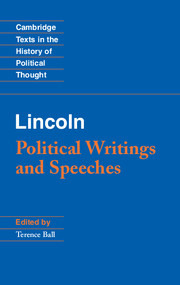Book contents
- Frontmatter
- Contents
- Preface
- Introduction
- Chronology
- Biographical synopses
- A note on sources and abbreviations
- Bibliographical note
- I Political Writings and Speeches
- 1 Autobiographical sketch
- 2 “The Perpetuation of Our Political Institutions”
- 3 Limits of Presidential Power
- 4 Speech on the Kansas–Nebraska Act
- 5 To Joshua F. Speed
- 6 Speech on the Dred Scott Decision
- 7 “A House Divided” Speech
- 8 Portion of a Speech at Edwardsville, Illinois
- 9 Seventh Lincoln–Douglas Debate
- 10 On Thomas Jefferson
- 11 Cooper Union Address
- 12 Speech at Indianapolis, Indiana
- 13 Speech at Independence Hall, Philadelphia, Pennsylvania
- 14 First Inaugural Address
- 15 Message to Congress in Special Session
- 16 Appeal to Border-State Representatives for Compensated Emancipation
- 17 Address on Colonization to a Committee of Colored Men
- 18 To Horace Greeley
- 19 Preliminary Emancipation Proclamation
- 20 Proclamation Suspending the Writ of Habeas Corpus
- 21 Second Annual Message to Congress
- 22 Final Emancipation Proclamation
- 23 To General John A. McClernand
- 24 To Erastus Corning and Others
- 25 To Matthew Birchard and Others
- 26 To James C. Conkling
- 27 The Gettysburg Address
- 28 Third Annual Message to Congress
- 29 Proclamation of Amnesty and Reconstruction
- 30 Reply to the New York Working-men’s Democratic Republican Association
- 31 To Albert G. Hodges
- 32 To Charles D. Robinson
- 33 Reply to a Southern Woman
- 34 “With Malice toward None”
- 35 Speech on Reconstruction
- II Notes and Fragments
- Index
7 - “A House Divided” Speech
Published online by Cambridge University Press: 05 April 2013
- Frontmatter
- Contents
- Preface
- Introduction
- Chronology
- Biographical synopses
- A note on sources and abbreviations
- Bibliographical note
- I Political Writings and Speeches
- 1 Autobiographical sketch
- 2 “The Perpetuation of Our Political Institutions”
- 3 Limits of Presidential Power
- 4 Speech on the Kansas–Nebraska Act
- 5 To Joshua F. Speed
- 6 Speech on the Dred Scott Decision
- 7 “A House Divided” Speech
- 8 Portion of a Speech at Edwardsville, Illinois
- 9 Seventh Lincoln–Douglas Debate
- 10 On Thomas Jefferson
- 11 Cooper Union Address
- 12 Speech at Indianapolis, Indiana
- 13 Speech at Independence Hall, Philadelphia, Pennsylvania
- 14 First Inaugural Address
- 15 Message to Congress in Special Session
- 16 Appeal to Border-State Representatives for Compensated Emancipation
- 17 Address on Colonization to a Committee of Colored Men
- 18 To Horace Greeley
- 19 Preliminary Emancipation Proclamation
- 20 Proclamation Suspending the Writ of Habeas Corpus
- 21 Second Annual Message to Congress
- 22 Final Emancipation Proclamation
- 23 To General John A. McClernand
- 24 To Erastus Corning and Others
- 25 To Matthew Birchard and Others
- 26 To James C. Conkling
- 27 The Gettysburg Address
- 28 Third Annual Message to Congress
- 29 Proclamation of Amnesty and Reconstruction
- 30 Reply to the New York Working-men’s Democratic Republican Association
- 31 To Albert G. Hodges
- 32 To Charles D. Robinson
- 33 Reply to a Southern Woman
- 34 “With Malice toward None”
- 35 Speech on Reconstruction
- II Notes and Fragments
- Index
Summary
In accepting the Republican nomination for the US Senate in 1858 Lincoln presented a particularly eloquent version of the Republican argument against the extension of slavery. Once again he makes the case against the argument advanced by his opponent, Senator Stephen A. Douglas, that the people (i.e., enfranchised white males) should decide democratically whether their state will enter the Union as a free or a slave state. In practice, Douglas’s doctrine of Popular Sovereignty would perpetuate the primary division within the “house” that is the American republic, and “a house divided against itself cannot stand.”
Mr. President and Gentlemen of the Convention,
If we could first know where we are, and whither we are tending, we could then better judge what to do, and how to do it.
We are now far into the fifth year, since a policy was initiated, with the avowed object, and confident promise, of putting an end to slavery agitation.
Under the operation of that policy, that agitation has not only, not ceased, but has constantly augmented.
In my opinion, it will not cease, until a crisis shall have been reached, and passed.
A house divided against itself cannot stand.
I believe this government cannot endure, permanently half slave and half free.
I do not expect the Union to be dissolved – I do not expect the house to fall – but I do expect it will cease to be divided. It will become all one thing, or all the other.
…
- Type
- Chapter
- Information
- LincolnPolitical Writings and Speeches, pp. 54 - 62Publisher: Cambridge University PressPrint publication year: 2012



